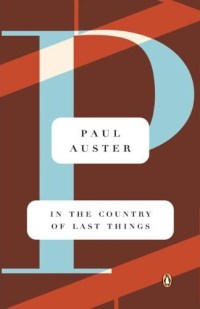In the Country of Last Things by Paul Auster
 Sunday, July 1, 2012 at 9:43AM
Sunday, July 1, 2012 at 9:43AM 
First published in 1987
I don't know whether In the Country of Last Things is post-apocalyptic in the strict sense of the word. It describes no apocalyptic event, and what people recall of the past is unreliable, the stuff of legend. The unnamed (presumably American) city that is the novel's focus is in a state of decay, seemingly the result of entropy rather than a single disaster-inducing cause. As the narrator describes it, "the city seems to be consuming itself." Most inhabitants are homeless, scrounging for food or scraps of formerly useful objects that can be resold. Many are simply waiting to die, often actively pursuing death (sometimes in bizarre ways), a desire that has given birth to creative and lucrative new businesses. Absurd religions flourish. Armed invaders seize buildings, evicting tenants; ownership of realty is a concept that belongs to a forgotten past. Religious groups -- all of them -- are oppressed. Scholarship is all but dead. The social compact is in ruins and the corrupt government is useless except as a disposer of dead bodies.
In the Country of Last Things is written as a letter from Anna Blume, a young woman who has traveled overseas to visit the city in search of her brother, a journalist who has not contacted his editor in nine months. Writing the letter, Anna feels she is "screaming into a vast and terrible blackness." Through all her hardships and struggles, her encounters with multiple sinners and occasional saints, Anna adapts and endures. Tragedy follows tragedy, interspersed with random acts of kindness. Ultimately, her life is reduced to a desire "to live one more day."
Paul Auster's novel explores (in Anna's words) "the most interesting question of all: to see what happens when there is nothing, and whether or not we will survive that too." The novel is bleak but the darkness is occasionally illuminated by pockets of hope -- there are a few people who offer unselfish assistance, who tend to the suffering -- suggesting, perhaps, that even when there is nothing, when all the safety nets have dissolved, a willingness to help strangers at the expense of one's own health and safety remains a fundamental component of human nature, at least for some. The unanswered question is whether those people will triumph, or whether they will be overcome by those who hoard resources, who control a dysfunctional government, who care only about their own lives.
The novel's ending is inconclusive. We do not know what will become of Anna, but that's the nature of life. None of us know our fate. In the Country of Last Things tells us that we have the power to make choices, and that even small and seemingly inconsequential decisions make it possible to survive, at least in spirit, when it seems that there is nothing left. An optimistic reader will think it likely that Anna will never lose her humanity despite the obstacles that impede her continuing journey.
As always, Auster's prose is lucid, his characters are well-defined, his imagery is scintillating, and his story merits serious thought and discussion. This may not be Auster's best work -- it is certainly a departure from the kinds of novels he wrote before and after this one -- but it is a powerful and compelling story told by one of the nation's most accomplished writers.
RECOMMENDED
Reader Comments